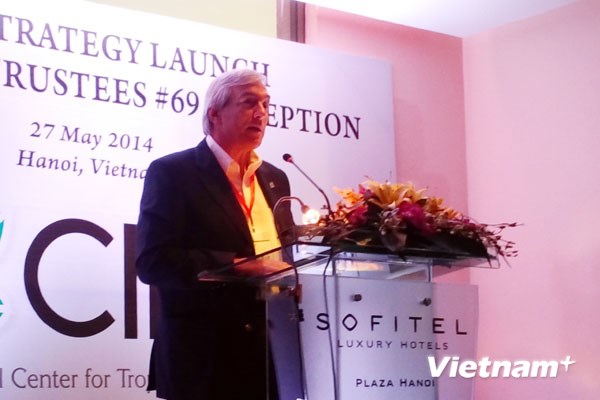CIAT helps boost agricultural food security and eco-efficiency in Vietnam

VAAS president Nguyen Van Bo, who has been working with CIAT since 1999 said “CIAT’s mission to reduce hunger and poverty and improve human nutrition in the tropics through research to increase the co-efficiency of agriculture is highly relevant to Vietnam and the region.”
“We recognise that across South East Asia, rapid urbanisation, population pressure and rising consumer wealth are already putting pressure on agricultural resources. Agriculture must be intensified to cope with rising demand from consumers, but using fewer resources with a lower environmental footprint to protect our natural resources,” he added.
CIAT’s new strategy outlines the importance of cassava, animal feed and sustainable soil management in achieving eco-efficiency goals in Asia. Cassava is the third most important food crop in the tropics after rice and maize, and CIAT-related varieties bred by local partner institutes are now grown on more than 50 per cent of the cassava area across the region.
When managed properly, cassava is a highly resource-efficient, climate-smart crop, with vast income generation for the poor as a raw material for manufacturing and pharmaceutical products, including starch, biofuels and other products.
According to the Ministry of Agriculture and Rural Development, in Vietnam alone cassava and its products generated $1.132 billion in 2013.
Improved animal feed, another focus of CIAT’s strategy in the region, has the potential to reduce the country’s reliance on imported feed stock. And appropriate management of tropical forages can stabilise and restore degraded land, enhance ecosystem services, boost milk and meat production, and mitigate impacts of climate change such as nitrogen-fixing legumes.
CIAT general director Ruben Echeverria said, “We are honoured to launch CIAT’s new global strategy in Hanoi. This is a reflection of renewed research commitments and collaboration with Vietnam’s research organisations and an indication of strengthened partnerships to ensure food security across the region.”
“Make agriculture more eco-efficient is essential to ensuring people in rural and urban areas have access to high-quality, nutritious food for a balanced diet as well as just enough calories – while preserving the environment and nurturing economic growth,” he said.
As recognised by the Vietnamese government in its national strategy on climate change, Vietnam is considered extremely vulnerable to the impacts of climate change. The Mekong Delta is one of the world’s three most vulnerable deltas (together with the Nile Delta in Egypt and the Ganges in Bangladesh) to rising sea levels’ significant economic and social impacts.
Over the last 50 years, the sea level in Vietnam has risen by 20cm and the country is expected to experience more extreme weather events, especially from storms, flooding and drought.
CIAT leads the CGIAR Research Programme on Climate Change, Agriculture and Food Security (CCAFS), which has a regional office in Hanoi. Empowering the rural poor in Vietnam with knowledge and information about key agricultural crops and new technology – especially in upland areas with make up 75 per cent of agricultural land in the country – will be vital to improving resilience to climate change.
Together with partner researchers at VAAS and across the region, CIAT has provided technical and research support to analyse climate impacts, with the intention of evaluating benefit-sharing trade-offs toward protecting eco-systems and linking farmers with sustainable commercial relationships and inclusive supply chain policies.
What the stars mean:
★ Poor ★ ★ Promising ★★★ Good ★★★★ Very good ★★★★★ Exceptional
Latest News
More News
- Congratulations from VFF Central Committee's int’l partners to 14th National Party Congress (January 25, 2026 | 09:46)
- List of newly-elected members of 14th Political Bureau announced (January 23, 2026 | 16:27)
- 14th Party Central Committee unanimously elects To Lam as General Secretary (January 23, 2026 | 16:22)
- List of members of 14th Party Central Committee announced (January 23, 2026 | 09:12)
- Highlights of fourth working day of 14th National Party Congress (January 23, 2026 | 09:06)
- Press provides timely, accurate coverage of 14th National Party Congress (January 22, 2026 | 09:49)
- Press release on second working day of 14th National Party Congress (January 22, 2026 | 09:19)
- Minister sets out key directions to promote intrinsic strength of Vietnamese culture (January 22, 2026 | 09:16)
- 14th National Party Congress: Renewed momentum for OVs to contribute to homeland (January 21, 2026 | 09:49)
- Party Congress building momentum for a new era of national growth (January 20, 2026 | 15:00)
















 Mobile Version
Mobile Version